'You think twice about driving': Fuel prices rise again
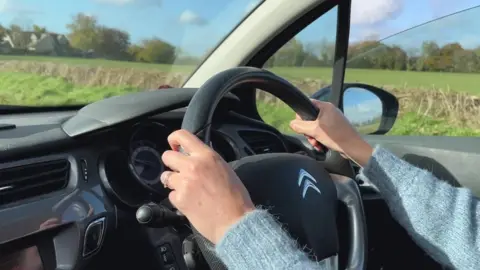 BBC News
BBC NewsThe price of diesel at UK pumps has gone above £1.90 for the first time in nearly three months.
The amount motorists pay has fallen significantly from the record highs seen at the start of July, but remains high compared with recent years.
Prices have once again started rising, with data from Experian showing a litre of diesel now costing 190.12p on average and petrol at 166.17p.
The AA said the gap between petrol and diesel had widened to 23.95p.
But it expects the price of both to begin levelling off soon, judging by wholesale costs.
Fuel is one factor which has further driven up the cost of living this year, as the rate at which prices are rising is at a 40-year high.
Many people who live in rural areas are particularly feeling the impact, being more dependent on cars for travelling longer distances and with fewer public transport alternatives.
A recent study by the Rural Services Network pointed out transport costs represented a higher proportion of rural households' income, and bus routes continued to be cut.
In a review, the Competition and Markets Authority said rural communities paid on average 1p-2p per litre more than urban areas.
This is likely to be because forecourts faced less competition, supplied lower fuel volumes and had higher transportation costs.
'Uncertain times'
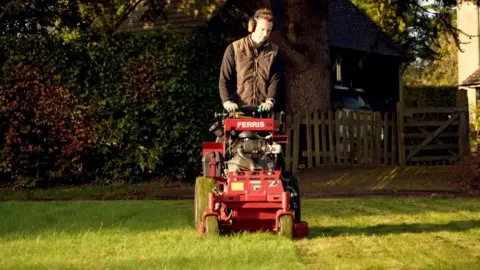 BBC News
BBC NewsRichard Morris runs Gloucestershire Gardens, a garden maintenance business. His livelihood depends on being able to travel around the countryside for work, so the cost of diesel is having an impact.
Filling his car plus the motorised gardening equipment in his trailer is costing £240 more per month than last year.
This eats into profits. "I was looking to scale up the business, employ a new member of staff, get another vehicle. But at the moment the times are just too uncertain to be able to do that."
He's now started to think twice about taking on jobs if they're too far away. "I've actually turned down work just because the fuel price would be too high to get to the job," he says.
For the hard-pressed home care sector, driving is also essential.
Joanne Folkes, the manager of Caremark in Gloucester and Stroud, says her firm upped the mileage paid to carers to ensure it covered the cost.
The business manages spend as best it can by tightening up rounds, so travel time and distance are minimised, as well as- trying new methods of transport.
"We've introduced mopeds, which is something not everybody is suited to but it's a very economic way of getting around", says Joanne.
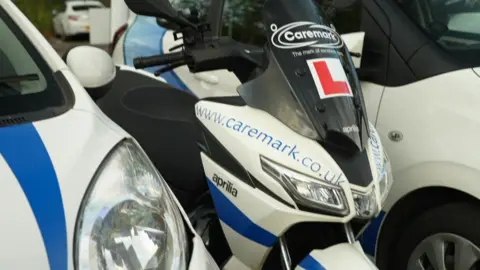 BBC News
BBC NewsFor many households too, fuel costs remain a burden.
At a community centre in the Gloucestershire village of Cam, we met Joan, Patience and David.
They are neighbours on a mobile home park a 10-minute drive away - which isn't served by a bus. "You'd have to walk a mile to get to the bus!", says 89-year-old Joan.
They all love living where they do, but rely on their cars for shopping and getting to social activities like bingo.
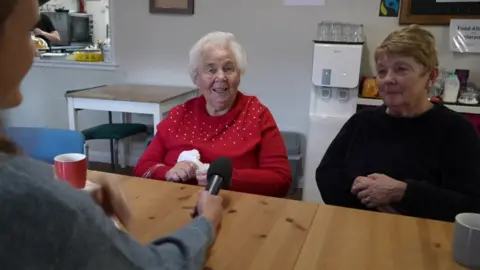 BBC News
BBC NewsThese days, fuel is eating into their budgets. David now plans journeys so he gets a few tasks done in one go, instead of making multiple journeys.
And he's cutting down on non-essential trips. "I used to pop in to Gloucester, which is 15 miles away, but now it's too expensive. Instead of going out for a ride, you just go to get the essentials."
Joan says: "You've got to cut back, and you think twice about driving. You think 'I don't want to use that petrol today'".
She wants to keep the car as long as possible to maintain her independence, but has started to decide against journeys that don't feel worth it.
Patience tries to control her spend instead of filling up her tank. "I do what you call a slap and a dash - you just put a little bit in, what you need".
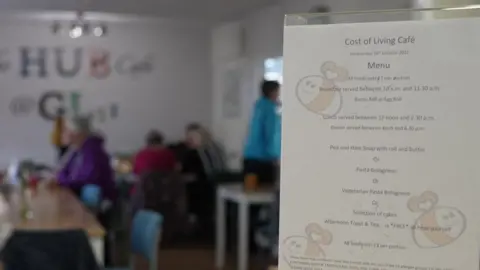 BBC News
BBC NewsToday, they've car-shared to come for lunch at this centre, called the GL11 Community Hub.
It has started focussing on helping people with the cost of living. There's advice, digital support, a warm place to enjoy an affordable meal, and a food bank.
There's also a "the food pantry" - where people pay a small amount for the products they take home. The centre is open until 7pm so people who work during the day can use it too.
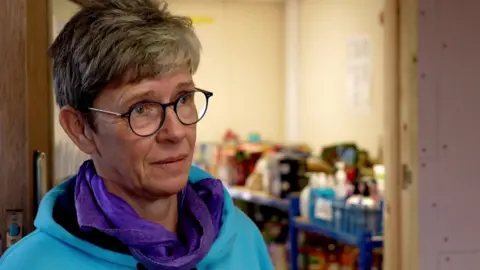 BBC News
BBC NewsThe organisation's CEO, Indigo Redfern, says demand has surged as cost pressures are "coming from every direction".
She describes fuel prices as "prohibitive", and says driving is often one of the things people cut down on where they can - which can have a knock-on impact on their quality of life.
Living in a spread-out area can make it difficult for some people to get to somewhere like the GL11 hub, where support is available.
Volunteers from the hub can drive grocery items to people who need them delivered instead, for example if they don't have a car and need too much to carry on foot.
"[They] are very kindly doing it out of their own pocket", says Indigo. "We haven't yet had anyone say to us that they can't afford to deliver food from our food banks. But I would anticipate that will start to happen."
